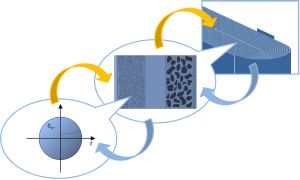The German Research Foundation (DFG) has decided to fund a new research training group at Karlsruhe Institute of Technology (KIT): “SiMET – Simulation of Mechanical, Electrical, and Thermal Processes in Lithium-ion Batteries” will start in 2017 and be funded initially for four and a half years. Within the research training group, doctoral researchers of several scientific disciplines will work on models to simulate, among others, the effect of different internal structures on the behavior of bat-teries in operation.
Batteries are considered key components for many future technologies, in particular for electric mobility or power supply from fluctuating, renewable sources. In many mobile and stationary applications ranging from smartphones to electric cars to battery storage systems in the power grid, lithium-ion batteries are being used. In the new research training group SiMET at KIT, doctoral researchers will develop models and numerical methods to simulate the interconnected mechanical, electrical, and thermal processes in lithium-ion batteries within the framework of their interdisciplinary PhD projects. Such simulation methods represent an important tool for the further development of efficient and high-performance battery systems.
Work of SiMET will consider both the multiscalarity of materials and components in batteries and multidisciplinarity of the processes taking place in them. Research will extend from particles in microporous electrodes to the complete cell, with sizes ranging from a few nanometers to some centimeters. Various disciplines will be involved, such as process technology, electrical engineering, mechanical engineering, materials sciences, chemistry, physics, and mathematics. The models will be designed for covering a broad spectrum of engineering issues. Among others, they are to be used to simulate the electrical operation behavior in a wide temperature range, to analyze the effect of different inner structures on the performance of the cells, and to enhance understanding of mechanically and thermally induced damage effects. In addition to model-based simulation, SiMET will offer direct access to experimental methods, including computer tomography and complex electrochemical and thermal measurement methods. The experiments will serve to determine parameters and validate the models.
“We are happy that a big group of doctoral researchers will now be given the opportunity to conduct joint research in this future-oriented and complex field for several years,” the Spokesperson of SiMET, Professor Thomas Wetzel, Head of the Heat and Mass Transfer Group of KIT’s Institute of Thermal Process Engineering (TVT), says. “SiMET will be based on close cooperation of engineering and natural sciences with their large range of perspectives. We are convinced that this will create best prerequisites for doctoral researchers to acquire new knowledge and develop new methods.”
Apart from Professor Thomas Wetzel as spokesperson, the following persons are involved in SiMET: Professor Wolfgang Bessler of Offenburg University of Applied Sciences as deputy spokesperson, Professor Willy Dörfler, PD Dr. Gisela Guthausen, Professor Ellen Ivers-Tiffée, Professor Marc Kamlah, Dr. Reiner Mönig, Professor Hermann Nirschl, and Dr. André Weber of KIT, as well as Professor Arnulf Latz of the Helmholtz Institute Ulm.
The doctoral researchers are to cover all scientific disciplines mentioned. Their structured education will be of individual character, but also extend beyond the research training group to the international level. Among others, interdisciplinary supervision teams, different scientific and soft skill courses, specific software courses, and the opportunity to take part in conferences and to conduct research abroad are envisaged.
In total, DFG will establish twenty new research training groups. All groups will be funded with about EUR 87 million for a period of four and a half years. The research training groups are aimed at qualifying doctoral researchers through a focused research program and structured qualification concept.
More about the KIT Energy Center: http://www.energie.kit.edu
In close partnership with society, KIT develops solutions for urgent challenges – from climate change, energy transition and sustainable use of natural resources to artificial intelligence, sovereignty and an aging population. As The University in the Helmholtz Association, KIT unites scientific excellence from insight to application-driven research under one roof – and is thus in a unique position to drive this transformation. As a University of Excellence, KIT offers its more than 10,000 employees and 22,800 students outstanding opportunities to shape a sustainable and resilient future. KIT – Science for Impact.

